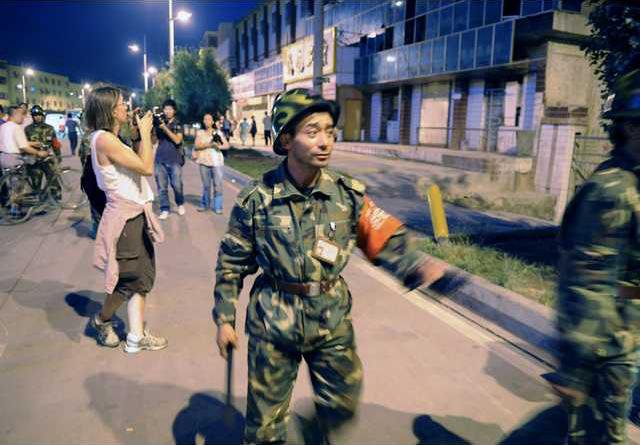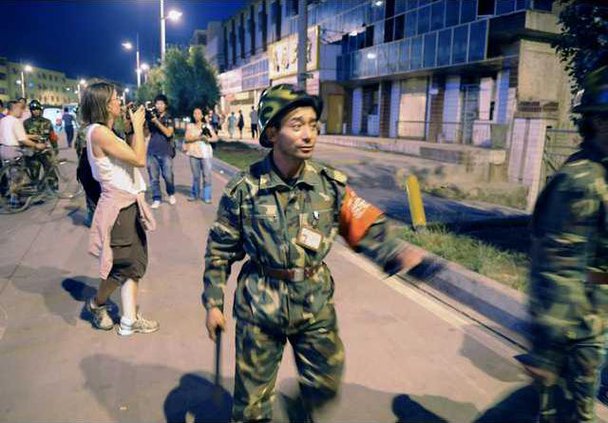KASHGAR, China — Blood was washed off the road. Debris was cleared away. And authorities said peace had been restored Tuesday in China’s restive Muslim region where 16 police were killed in an attack that may have been timed to overshadow Olympic celebrations.
But there were plenty of other signs suggesting all was not well in Kashgar, this ancient Silk Road city near the border with Afghanistan and Pakistan at the opposite end of China from Beijing.
Townspeople were reluctant to talk about Monday’s brazen assault. Police stepped up security checks and put schools, hospitals and government offices on heightened alert, state-run media and locals said. Slogans on billboards, walls and buildings urged people to create a more secure and harmonious society.
The precautions underscored the Chinese government’s sensitivity to anything that could sour its plans for the Beijing Games to be a pivotal moment of national glory and global acceptance, despite continuing criticism of its record on human rights.
Kashgar is 2,200 miles west of Beijing, in the far western region of Xinjiang — a vast, rugged territory home to a Muslim minority called the Uighurs (WEE’-gurs). They have a long history of pushing for independence, and Chinese authorities have blamed a series of sporadic bombings, shootings and riots in recent years on Uighur extremist groups.
One such group, believed to be based in the remote tribal regions of Pakistan, released a video tape last month threatening to target the Olympics.
But many Uighur activists accuse Chinese officials of exaggerating the terrorism threat to justify a crackdown on the ethnic minority. They claim the clampdown has greatly intensified during the run-up to the Olympics, which start Friday.
Monday’s attack was one of the most audacious in years.
Two men — a taxi driver and a vegetable seller — drove a truck into a group of 70 border police during their routine morning jog in a northwestern neighborhood, where several popular tourist hotels are located, the state-run Xinhua News Agency reported.
The attackers, ages 28 and 33, tossed homemade bombs at the officers and stabbed them with knives, killing 16 and wounding another 16 before being captured, the report said.
One of the attackers lost a hand when the homemade explosives blew up, about 100 yards from the border police base. Police later recovered additional explosives, a homemade gun and ‘‘propaganda materials about a holy war,’’ state media said.
Kashgar’s Communist Party secretary, Shi Dagang, called the assault an act of premeditated terrorism and told reporters the two attackers prepared written statements beforehand saying that ‘‘they had to wage ’holy war,’’’ Xinhua said.
The weapons police recovered at the scene were similar to weapons found last year in raids on a training base of the East Turkistan Islamic Movement, Shi was quoted as saying. The group is reportedly based along China’s borders with Afghanistan and Pakistan and linked to al-Qaida and to Hizb ut-Tahrir, an extremist group that originated in the Middle East in the 1950s.
By Tuesday, authorities had meticulously cleaned up the attack scene on a six-lane, tree-lined street in front of the low-budget Yiquan Hotel, a low-rise building covered in dusty white, yellow and maroon tiles.
Blood stains and debris from the truck crash and bomb blasts couldn’t be seen on the pavement. Three or four trees that apparently were knocked over by the truck had been neatly uprooted and taken away.
Foreign reporters have rushed to Kashgar to report on the attack, adding an unusual level of scrutiny in a normally isolated region even as attention on China intensifies because of the Olympics.
Police beat two Japanese reporters who were among those sent to cover the story, while detaining them about two hours at a police station late Monday. Chinese officials apologized Tuesday, but Japan’s government said it would lodge a formal protest.
The jitters filtered down to locals. One Chinese merchant who owns a small liquor store near the attack site dodged questions from a large group of foreign reporters.
‘‘I’m just a small citizen of this country. I’m just a businessman. I don’t remember hearing or seeing anything. I just run my business. Leave me alone,’’ said the man, who declined to provide his name.
A couple blocks away, a waitress at a snack shop said the bombs must have been crudely made because they weren’t loud. She said they sounded like a car tire bursting.
‘‘We’re not really worried about these things,’’ said the waitress, who would only give her surname, Chen. ‘‘It happens in other parts of the world, too.’’
Across the street from the attack site, a plainclothes officer with a video camera taped reporters as they tried to interview people. Four soldiers in green camouflage uniforms and matching helmets patrolled gripping clubs. A uniformed officer leaned against his motorcycle and watched.
‘‘I’m not sure what happened yesterday,’’ the officer told an Associated Press reporter. ‘‘But I can tell you that this area is safe. You can cover the news here without worrying about it.’’
At the border police base, only two guards stood lazily at the front gate. When a taxi pulled up in front and dropped off two elderly Uighur women, the guards snapped to attention and barked at the driver: ‘‘You can’t stop here! Move on!’’
In Kashgar’s old section, with winding alleys and crowded shops where men bake wheels of golden flat bread and grill lamb kebabs, most merchants and shoppers avoided expressing opinions.
But one carpet dealer, who would only identify himself as Samet: said, ‘‘I don’t know who these attackers are. I think they come from the countryside. But all I know is that it’s bad for me. It scares away the foreign tourists.’’
But there were plenty of other signs suggesting all was not well in Kashgar, this ancient Silk Road city near the border with Afghanistan and Pakistan at the opposite end of China from Beijing.
Townspeople were reluctant to talk about Monday’s brazen assault. Police stepped up security checks and put schools, hospitals and government offices on heightened alert, state-run media and locals said. Slogans on billboards, walls and buildings urged people to create a more secure and harmonious society.
The precautions underscored the Chinese government’s sensitivity to anything that could sour its plans for the Beijing Games to be a pivotal moment of national glory and global acceptance, despite continuing criticism of its record on human rights.
Kashgar is 2,200 miles west of Beijing, in the far western region of Xinjiang — a vast, rugged territory home to a Muslim minority called the Uighurs (WEE’-gurs). They have a long history of pushing for independence, and Chinese authorities have blamed a series of sporadic bombings, shootings and riots in recent years on Uighur extremist groups.
One such group, believed to be based in the remote tribal regions of Pakistan, released a video tape last month threatening to target the Olympics.
But many Uighur activists accuse Chinese officials of exaggerating the terrorism threat to justify a crackdown on the ethnic minority. They claim the clampdown has greatly intensified during the run-up to the Olympics, which start Friday.
Monday’s attack was one of the most audacious in years.
Two men — a taxi driver and a vegetable seller — drove a truck into a group of 70 border police during their routine morning jog in a northwestern neighborhood, where several popular tourist hotels are located, the state-run Xinhua News Agency reported.
The attackers, ages 28 and 33, tossed homemade bombs at the officers and stabbed them with knives, killing 16 and wounding another 16 before being captured, the report said.
One of the attackers lost a hand when the homemade explosives blew up, about 100 yards from the border police base. Police later recovered additional explosives, a homemade gun and ‘‘propaganda materials about a holy war,’’ state media said.
Kashgar’s Communist Party secretary, Shi Dagang, called the assault an act of premeditated terrorism and told reporters the two attackers prepared written statements beforehand saying that ‘‘they had to wage ’holy war,’’’ Xinhua said.
The weapons police recovered at the scene were similar to weapons found last year in raids on a training base of the East Turkistan Islamic Movement, Shi was quoted as saying. The group is reportedly based along China’s borders with Afghanistan and Pakistan and linked to al-Qaida and to Hizb ut-Tahrir, an extremist group that originated in the Middle East in the 1950s.
By Tuesday, authorities had meticulously cleaned up the attack scene on a six-lane, tree-lined street in front of the low-budget Yiquan Hotel, a low-rise building covered in dusty white, yellow and maroon tiles.
Blood stains and debris from the truck crash and bomb blasts couldn’t be seen on the pavement. Three or four trees that apparently were knocked over by the truck had been neatly uprooted and taken away.
Foreign reporters have rushed to Kashgar to report on the attack, adding an unusual level of scrutiny in a normally isolated region even as attention on China intensifies because of the Olympics.
Police beat two Japanese reporters who were among those sent to cover the story, while detaining them about two hours at a police station late Monday. Chinese officials apologized Tuesday, but Japan’s government said it would lodge a formal protest.
The jitters filtered down to locals. One Chinese merchant who owns a small liquor store near the attack site dodged questions from a large group of foreign reporters.
‘‘I’m just a small citizen of this country. I’m just a businessman. I don’t remember hearing or seeing anything. I just run my business. Leave me alone,’’ said the man, who declined to provide his name.
A couple blocks away, a waitress at a snack shop said the bombs must have been crudely made because they weren’t loud. She said they sounded like a car tire bursting.
‘‘We’re not really worried about these things,’’ said the waitress, who would only give her surname, Chen. ‘‘It happens in other parts of the world, too.’’
Across the street from the attack site, a plainclothes officer with a video camera taped reporters as they tried to interview people. Four soldiers in green camouflage uniforms and matching helmets patrolled gripping clubs. A uniformed officer leaned against his motorcycle and watched.
‘‘I’m not sure what happened yesterday,’’ the officer told an Associated Press reporter. ‘‘But I can tell you that this area is safe. You can cover the news here without worrying about it.’’
At the border police base, only two guards stood lazily at the front gate. When a taxi pulled up in front and dropped off two elderly Uighur women, the guards snapped to attention and barked at the driver: ‘‘You can’t stop here! Move on!’’
In Kashgar’s old section, with winding alleys and crowded shops where men bake wheels of golden flat bread and grill lamb kebabs, most merchants and shoppers avoided expressing opinions.
But one carpet dealer, who would only identify himself as Samet: said, ‘‘I don’t know who these attackers are. I think they come from the countryside. But all I know is that it’s bad for me. It scares away the foreign tourists.’’

